It was a three-day period of horror, marked by loss of lives and beatings, as the fangs of police brutality made a chilling return in Nyanza, leaving behind grieving families and maimed victims.
Hopes that the horrific scenes witnessed in 2017, which resulted in the tragic death of six-month-old Baby Samantha Pendo at the hands of rogue police officers, would be the final chapter of police brutality, were shattered as police officers responded to protests with brutal force.
Reports confirmed that four people have died in Kisumu since Wednesday.
As of yesterday, three patients admitted at Jaramogi Oginga Odinga Teaching and Referral Hospital (JOOTRH) had between eight and nine bullets lodged in their chests, as doctors struggled to save their lives.
The depth of their injuries highlights the brutal response police officers adopted to quell protests and spared no one who crossed their paths while hunting others in Kisumu’s slums.
-
-
We will beat you in 2027, Ruto tells Azimio
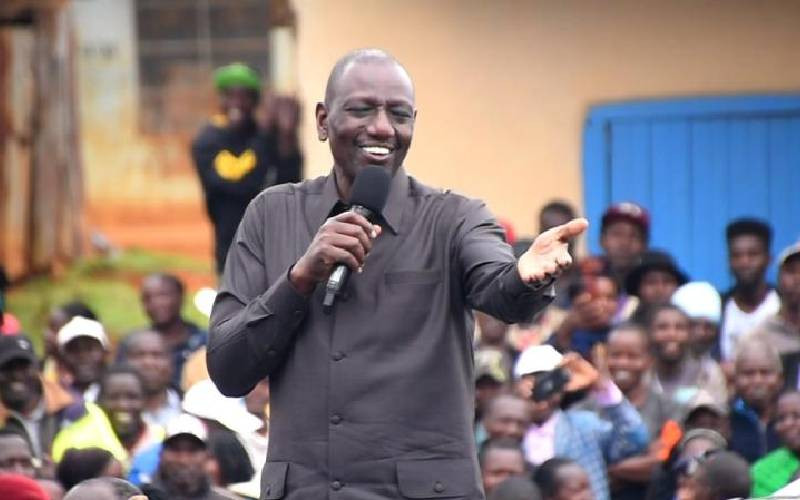
-
Babu Owino released in dramatic hearing amid claims of torture
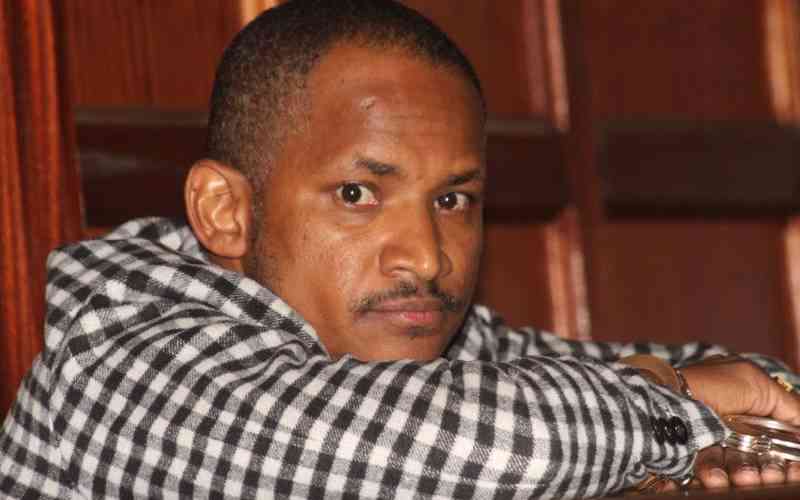
-
We are headed for interesting times in our search for good governance
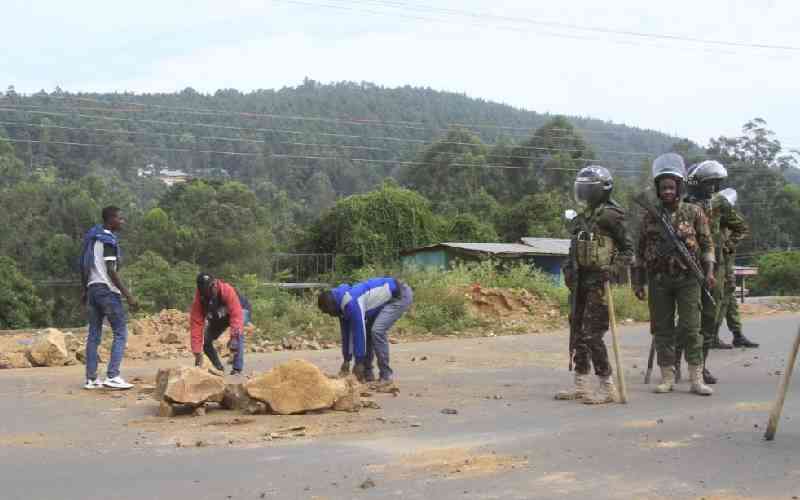
-
How Ruto's promise of non-partisan police service is quickly being eroded
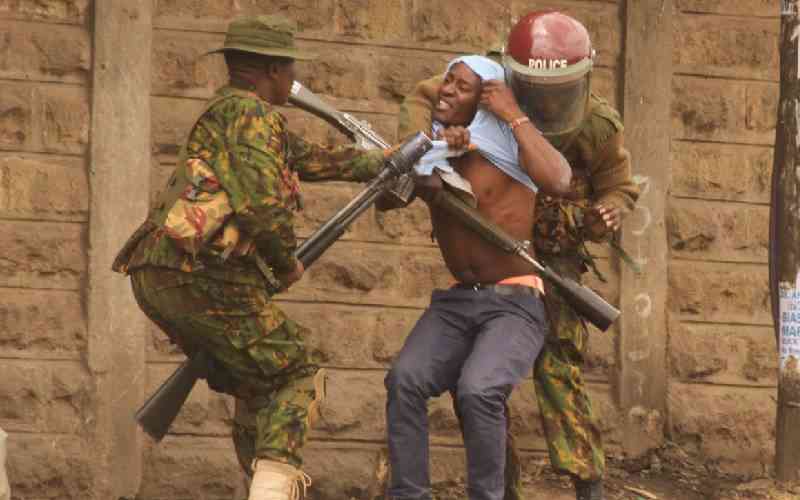
Reports indicate that more than 70 patients were nursing gunshot wounds in hospitals across the region.
At the facility, a total of 21 casualties were received on Thursday alone. Although the number was a slight decline from the 37 cases that were handled by the facility on Wednesday, it highlights the severity of the brutal response by law enforcement to the protestors.
According to the facility’s CEO, George Rae, 14 of the victims of the protests on Thursday were admitted, while the medics at the facility also conducted 15 emergency operations.
This happened as the death toll from the protests in Kisumu alone rose to four between Wednesday and Thursday after another victim was shot dead in Kondele. Yesterday, at least four victims were taken to the facility as protests entered the last day.
At Kisumu District Hospital, the body of a second-year engineering student at Kisumu Polytechnic lay in the facility’s mortuary. He was among those who were shot as police officers dispersed protestors.
In Nyalenda slums, an evening of terror on Thursday and yesterday morning saw police officers leave six people nursing gunshot wounds.
The densely populated estate turned into a battle scene as police officers walked through corridors to engage protestors.
At Howic Medical Centre, six victims were treated for gunshot wounds. John Otieno, a doctor at the facility, said that five of the victims were shot with rubber bullets while one was shot with a live bullet.
“Most of the patients attended to yesterday had gunshot wounds, while several others suffered minor injuries from blunt objects,” he said.
Carlos Okoth, a 19-year-old who was shot in the knee, said he was attacked by a police officer dressed in civilian clothes at his doorstep. He said he had been washing dishes before the police officers raided his house.
“I saw people running away, and moments later, police officers riding motorcycles attacked me,” he claimed.
Bernard Ouma, a resident, said he witnessed police on motorbikes brutally attacking and shooting at civilians in the estate.
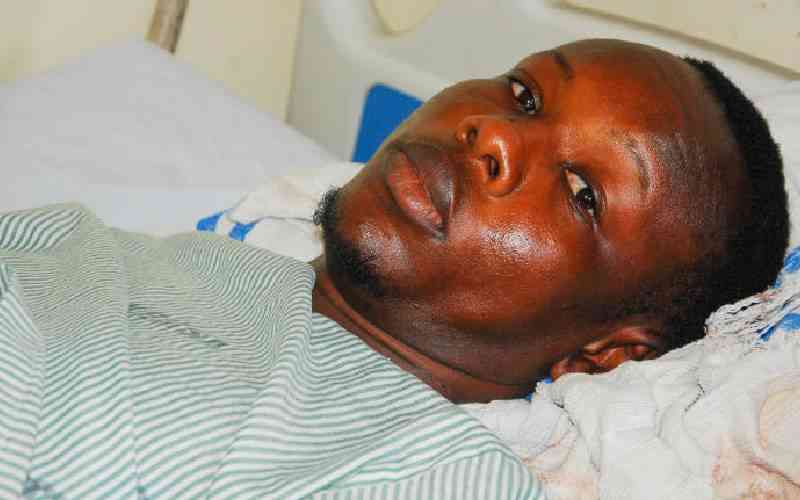
“People had to lock themselves up in their houses from 4pm to 8pm for fear of being hurt by the police, who were shooting aimlessly at residents,” he said.
But Kisumu was not alone; a similar scenario was also reported in Homa Bay and Migori, where scores of people are also nursing gunshot wounds as police quelled protests.
In Homa Bay, several victims of police brutality are writhing in pain in various hospitals as they seek help from well-wishers. At Homa Bay County Referral Hospital, we met three survivors with bullet injuries on various parts of the body.
The victims sustained the injuries in Rongo town, Migori County, on Thursday evening. The worst victim was Lameck Owuor, a 28-year-old man who was shot in the neck.
Owuor, a resident of Rongo town, could not utter any word after being shot in the neck, which left his neck and mouth swollen.
Homa Bay County Referral Hospital Chief Executive Officer, Peter Ogola, said they were planning to transfer him to Kisii County Hospital for specialized medication. “We want to refer him to a specialist in Kisii,” Owuor said.
Derick Otieno, 18, a resident of Rongo, sustained a bullet injury on his upper right arm. Otieno said he was shot on his way from his workplace to his house.
“I was trekking from where I cook doughnuts when I encountered the police. I suddenly realised I had been shot,” Otieno said. He appealed to well-wishers to support him in meeting his medical bills. “The main concern is my health. I appeal to well-wishers to support me.”
Steve Olando, a 28-year-old resident of Rongo town, was in agony too. Olando sustained a gunshot wound on his left shoulder near Rongo Primary School. He was taken to Rongo Sub-county Hospital and referred to Homa Bay County Referral Hospital.
Olando said he was not part of the protestors. He said he was going to Kamagambo Police Station to find out the whereabouts of his niece, who had been arrested.
On Thursday morning, six people from Homa Bay town were admitted to Homa Bay County Referral Hospital with gunshot wounds.
Yesterday, activists and residents protested the alleged use of excessive force by the police. Efforts to get a comment from the police were futile. [Harold Odhiambo, Sharon Owino, Anne Atieno and James Omoro]






